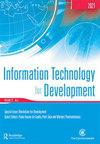Demonstrating critically reflexive ICT4D project conduct in rural South Africa
IF 5.1
3区 管理学
Q1 DEVELOPMENT STUDIES
引用次数: 6
Abstract
ABSTRACT The problem with many ICT4D projects designed for African developmental contexts is that there is a tendency towards deterministic assumptions, in that arguments and implementation guidelines are often presented a-contextually. The reality of the author’s lived experience, however, was that ICT4D practices in the African context imply cross-cultural working and worldview collisions. Simply adopting Western values and advice wholesale without adequate reflection, may lead to a design-reality gap, oppressive ICT transfer, and ultimately failure. Understanding cultural context and local development realities may present challenges, because it is interwoven with the assumptions and prejudices of those identifying and representing context from the outside. While there are attempts at addressing these issues, more nuanced examples adequately sensitized to ethical reasoning, insider knowledge, and power dynamics in cross-cultural working, are needed. This paper reflects on how a critical ethnography informed and transformed ICT4D project practices for the developmental realities of a traditional Zulu community in South Africa. Confessional narratives, representing both method and phenomena, are used as case analogies for outsider researchers and practitioners to draw on, firstly; to self-reflect on their own false consciousness and misguided assumptions, and secondly; to make sense of the typical abstractness of ICT4D project guidance and principles.在南非农村展示批判性反思性ICT4D项目行为
许多为非洲发展背景设计的ICT4D项目的问题在于,存在一种确定性假设的倾向,即论点和实施指南通常是根据背景提出的。然而,作者的现实生活经验是,非洲背景下的ICT4D实践意味着跨文化工作和世界观冲突。简单地全盘接受西方的价值观和建议,而不进行充分的反思,可能会导致设计与现实之间的差距,压迫性的信息通信技术转移,最终导致失败。理解文化背景和当地发展现实可能会带来挑战,因为它与那些从外部识别和代表背景的人的假设和偏见交织在一起。虽然有解决这些问题的尝试,但需要更多细致入微的例子,以充分敏感的道德推理、内部知识和跨文化工作中的权力动态。本文反映了关键人种学如何为南非传统祖鲁社区的发展现实提供信息并改变ICT4D项目实践。首先,自白叙事既代表了方法,也代表了现象,被用作案例类比,供外部研究者和实践者借鉴;自我反省自己的错误意识和被误导的假设,其次;理解ICT4D项目指导和原则的典型抽象性。
本文章由计算机程序翻译,如有差异,请以英文原文为准。
求助全文
约1分钟内获得全文
求助全文
来源期刊

Information Technology for Development
Multiple-
CiteScore
11.30
自引率
16.70%
发文量
34
期刊介绍:
Information Technology for Development , with an established record for publishing quality research and influencing practice, is the first journal to have explicitly addressed global information technology issues and opportunities. It publishes social and technical research on the effects of Information Technology (IT) on economic, social and human development. The objective of the Journal is to provide a forum for policy-makers, practitioners, and academics to discuss strategies and best practices, tools and techniques for ascertaining the effects of IT infrastructures in government, civil societies and the private sector, and theories and frameworks that explain the effects of IT on development. The concept of development relates to social, economic and human outcomes from the implementation of Information and Communication Technology (ICT) tools, technologies, and infrastructures. In addition to being a valuable publication in the field of information systems, Information Technology for Development is also cited in fields such as public administration, economics, and international development and business, and has a particularly large readership in international agencies connected to the Commonwealth Secretariat, United Nations, and World Bank.
 求助内容:
求助内容: 应助结果提醒方式:
应助结果提醒方式:


